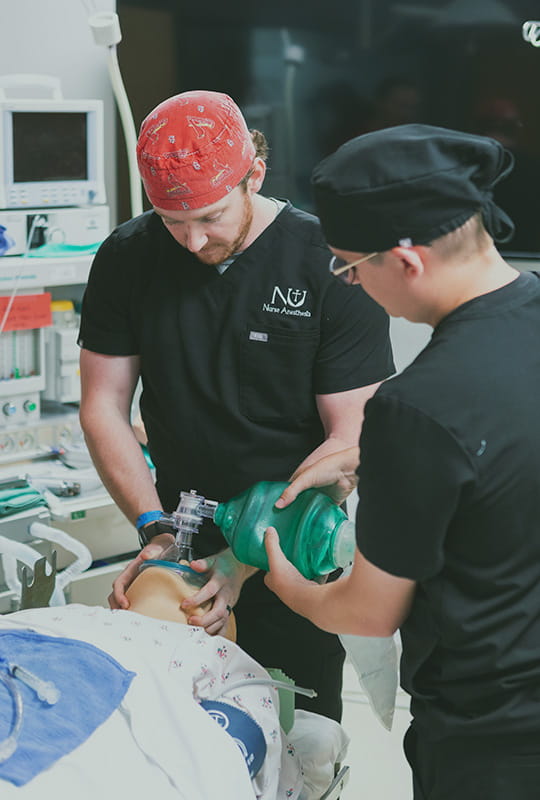The Doctor of Nurse Anesthesia Practice (DNAP) program at Newman University has been designed for the baccalaureate-prepared registered nurse who wishes to become a Certified Registered Nurse Anesthetist.
The program offers both didactic and clinical education to enable the student to acquire the knowledge, skills, and competence necessary to assume an advanced practice role.
| Newman University’s Nurse Anesthesia program is one of only two in the state of Kansas. | |
| Competitive hourly credit at $1,236 / credit hour. See tuition & fees | |
| Hands-on use of industry-leading technology and equipment to gain the experience needed in the field. |
Admission RequirementsMinimum GPA requirements: Minimum overall GPA ≥ 3.0 OR ≥ 3.2 last 60 credit hours Minimum science GPA ≥ 3.0 strongly recommended Prerequisite Courses: Statistics course: Must contain content on both parametric and nonparametric statistics which are components of most basic statistics courses. Please note that a nursing research class does not meet this requirement. RN Licensure: Unrestricted license as a professional registered nurse. Upon admission to the program, students must possess either a compact nursing license OR a Kansas registered nurse license (and if selected for an Oklahoma City primary site, must possess either a compact nursing license OR Oklahoma registered nurse license). Certifications: BLS ACLS PALS CCRN preferred Critical Care Experience: Minimum of 1 year (2 years preferred) full-time employment in an ICU is required. This must be within the 2 years of the start of the program. Acceptable ICUs include: cardiac ICU, medical ICU, neuro ICU, trauma ICU, etc. The Admissions and Progression Committee has found that successful applicants most often have adult ICU experience; however, PICU experience is acceptable to meet the critical care requirement. NICU, PACU, ER, OR, POCU do NOT meet the requirements for admission to the Newman University Doctor of Nurse Anesthesia Practice Program. A minimum of 1 year must be from a hospital within the 50 states, US territories, or at a US military hospital. Bachelor’s Degree: Earned bachelor’s degree from a fully-accredited college or university. BSN (from a CCNE or ACEN School of Nursing) is preferred but not required. Professional References: Three professional references are required. One must be from a current supervisor. Personal Statement: A personal essay should be submitted in which the applicant demonstrates graduate-level writing ability. The personal essay should reflect the applicant’s professional development as a registered nurse in critical care and how this will translate to success in an advanced practice role as a nurse anesthetist. The personal statement should be 2 pages or less. Current Resume/CV: Background check/drug screen: If accepted to the program, all students must pass a background check and drug screen prior to the start of the nurse anesthesia program. This will be at the cost of the student, and information will be given after acceptance is granted. Shadow experience: Shadow experience of an anesthesia provider actively administering anesthesia is preferred. There is no minimum requirement of shadowing hours. Personal interview: A professional interview is required for acceptance to the Newman University Nurse Anesthesia Program. Invitations for professional interviews will be sent to selected applicants by mid-September. Interviews with the Admissions and Progression Committee will be conducted in October and/or November. The interview will provide the applicant the opportunity to demonstrate knowledge in the areas of pharmacology, physiology, pathophysiology, and critical thinking as it relates to their unique critical care experience and patient population. | |||
Required CurriculumThis is a 36-month, fulltime, in-person program encompassing summer, fall, and spring semesters for the three-year period.88 Total Credit Hours Including:
|

Twins Lucas and Blake Rawls, who both earned DNAP degrees, described graduation as a "crazy experience" after 24 years of continuous education. Before earning their doctoral degrees from Newman, Blake worked in the trauma intensive care unit at Oklahoma Children’s Hospital OU Health, while Lucas worked in the cardiac center at the same hospital.
Doctor of Nurse Anesthesia, Lucas and Blake Rawls

"As a anesthetist, you're a patient is placing their life in your hands. They're in their most vulnerable state and you're responsible for protecting them and ensuring that they're going to come out of their anesthetic the way they went into it. And I just think that's a great privilege and a great honor."
Doctor of Nurse Anesthesia, Elise Lake

